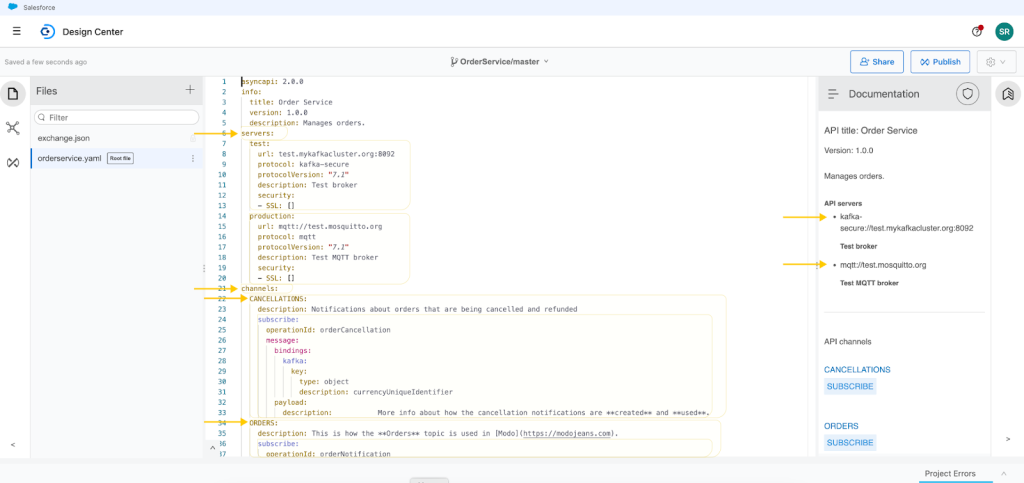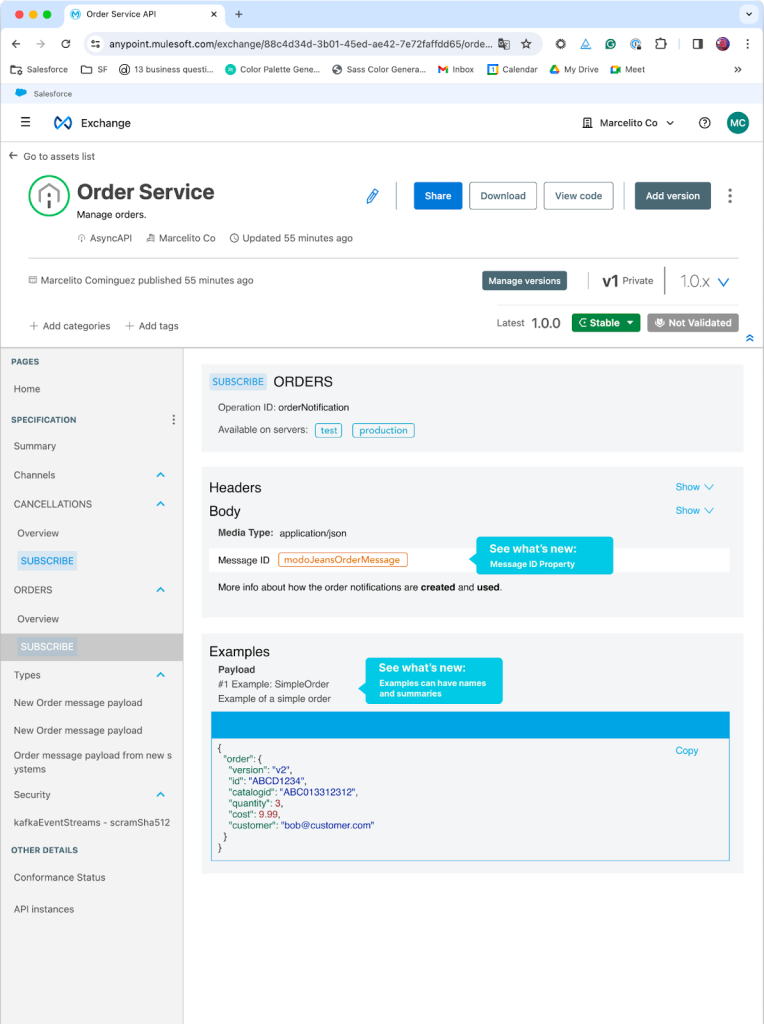There has been rapid growth in the adoption of event-driven architectures (EDA) as organizations look to increase resilience and minimize latency across their systems and applications. To help simplify their journey to EDA, MuleSoft is thrilled to announce the addition of event-driven architecture support on Anypoint Platform.
Organizations that want to embark on a journey toward event-driven architectures need to invest in adapting their enterprise to support evented systems and applications. Simply investing in an event broker or message queue is just the first part of that journey. They also need to integrate their evented systems into their application network. With the addition of AsyncAPI support, organizations now have a unified platform for end-to-end, event-driven integration.
The new capabilities on Anypoint Platform enable organizations to design, govern, and catalog AsyncAPI 2.6 specifications, and implement event-driven applications. Learn more about using AsyncAPI on Anypoint Platform in our demo video.
Design AsyncAPI Specs with Open Standards
The new updates to Anypoint Platform makes it easier than ever to design and document your AsyncAPIs. By using Anypoint API Designer, you can simplify the creation of AsyncAPI specifications that adhere to the 2.6 standard. This ensures consistency across all your event-driven applications.
Additionally, the platform allows for automatic generation of documentation for your AsyncAPI specifications, which enhances clarity and understanding for all team members involved. This streamlined approach not only promotes adherence to open standards but also fosters collaboration and efficiency within your organization.

Govern AsyncAPI specs with best practices and rulesets
Governance should be a key consideration for any growing organization. The new updates help ensure robust security and compliance for AsyncAPIs through API governance at design time. Developers and architects can validate their AsyncAPI specifications against their organization’s governance rulesets and best practices during the design phase. Applying a ruleset or best practice highlights critical issues in red and suggestions in yellow, allowing developers and architectures to easily understand how to comply.
This proactive approach minimizes the risk of publishing non-compliant assets, ensuring that all AsyncAPI specifications conform to your organization’s standards. Using a scalable governance model against AsyncAPI specifications helps promote consistent and secure event-driven applications across the organization.
Discover and reuse AsyncAPI specs across teams
Increase the visibility and accessibility of your AsyncAPI specifications by publishing them directly to MuleSoft’s public marketplace, Anypoint Exchange. Cataloging your AsyncAPI specifications simplifies sharing access to event-driven systems within your organization, while encouraging teams that don’t have specialized knowledge in a specific event-broker or message queue to easily interact with them. A single, well-defined AsyncAPI specification can standardize connectivity for an entire team or even an entire organization.
By reusing these specifications, developers can create a more streamlined approach to accessing their event broker or message queue, ultimately boosting productivity. This centralized repository not only promotes efficient collaboration but also ensures consistent implementation of event-driven architectures across your enterprise.

Implement event-driven applications by using simple tooling
The standout feature of this release is the new approach to the implementation of event-driven applications. The configuration-driven experience significantly reduces the complexity of interacting with event brokers and message queues. With MuleSoft’s IDEs (Anypoint Code Builder and Anypoint Studio) now supporting the new APIkit for AsyncAPI, most of the implementation work is automated based on the AsyncAPI specification. This includes scaffolding, connector configuration, message validation, logging, and data mapping.
Traditionally, developers had to engage in extensive manual work when implementing their applications, which required extensive knowledge of the event broker or message queue. Now, organizations just need to have proper AsyncAPI specifications built, and any team can easily build event-driven applications in record times. This makes it as easy to work AsyncAPIs and it is to work with REST on Anypoint Platform.
The implementation capabilities for EDA are currently in open beta, with support for building event-driven applications for Kafka and Anypoint MQ. We plan to extend support to Solace PubSub+ and Salesforce Platform Events in October 2024.
Event-driven architectures – revolutionized
The addition of AsyncAPI support on the Anypoint Platform marks a significant advancement in the journey toward robust event-driven architectures. By providing a comprehensive suite of tools and capabilities, MuleSoft enables organizations to design, govern, catalog, and implement AsyncAPI specifications with ease and efficiency. With this latest release, organizations can confidently embark on their event-driven architecture journey, knowing they have a unified and powerful platform to support their needs every step of the way.
Learn more through the following resource material to stay up-to-date with event-driven architecture support on Anypoint Platform:









